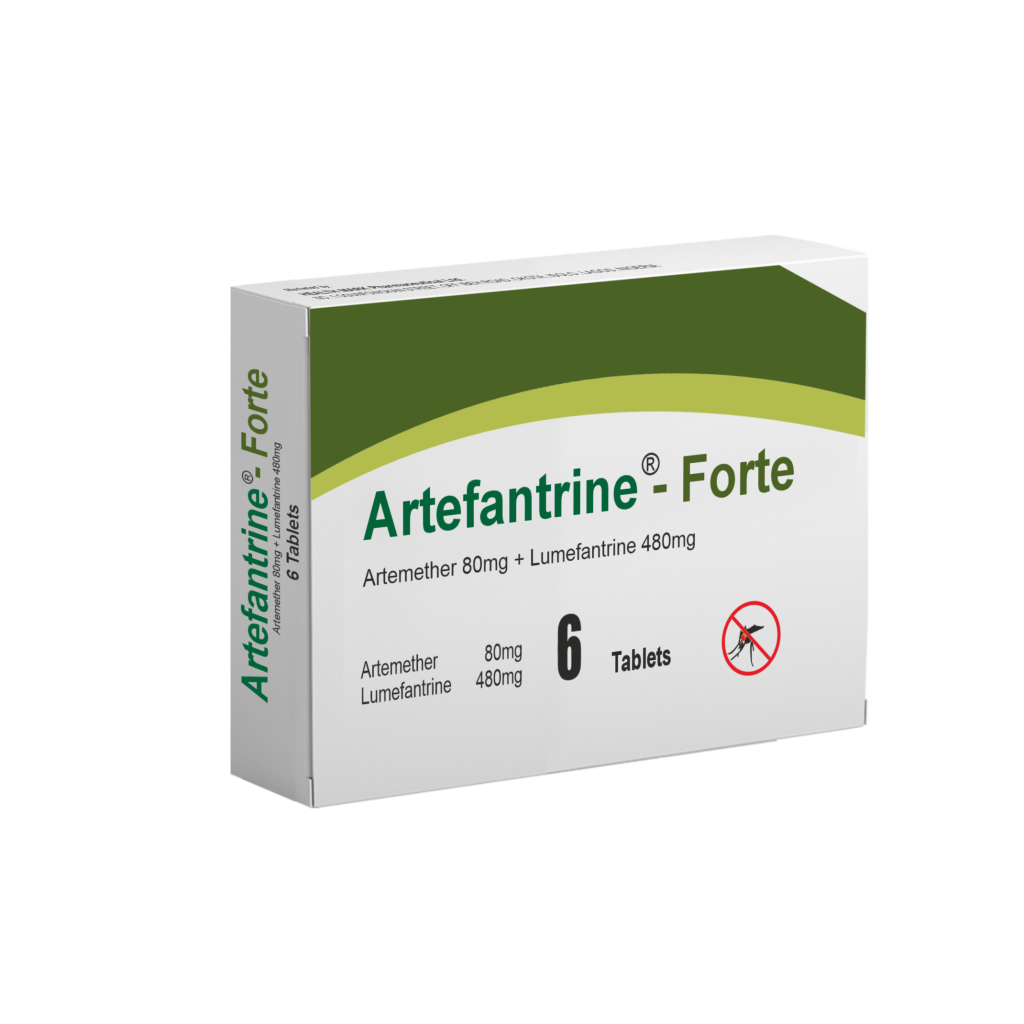Artemether 80mg with Lumefantrine 480mg Tablet
- Artemether 80mg + Lumefantrine 480mg
Therapeutic Class: Anti-Infectives
Dosage Forms: Tablets
Brand Name: Artefantrine - Forte™

How it works?
Uses of Artemether 80mg with Lumefantrine 480mg Tablet
What are the uses of Artemether 80 mg with Lumefantrine 480 mg Tablet?
Artemether 80 mg with Lumefantrine 480 mg Tablet is indicated for the treatment of uncomplicated cases of malaria due to Plasmodium falciparum in adults and children of 35 kg and above.
The most recent official guidelines on the appropriate use of antimalarial agents and local information on the prevalence of resistance to antimalarial drugs must be taken into consideration for deciding on the appropriateness of therapy with the tablet.
1. Treatment of Malaria (Plasmodium falciparum) This tablet is used to treat acute, uncomplicated malaria caused by Plasmodium falciparum, including strains that are resistant to other antimalarial drugs.
2. Fast Parasite Clearance Artemether acts quickly to kill malaria parasites in the blood, reducing symptoms like fever, chills, and body aches.
3. Prevents Parasite Growth & Spread Lumefantrine works by stopping the parasite from multiplying, helping to clear the infection completely.
4. Suitable for Adults & Children Recommended for both adults and children with non-severe malaria. Not used for prevention or severe cases involving the brain, lungs, or kidneys.
5. Emergency Stand-by Treatment Sometimes prescribed for travelers to malaria-endemic areas who may not have access to medical care within 24 hours of symptoms.
Precautions of Artemether 80mg with Lumefantrine 480mg Tablet
Precautions while taking Artemether 80 mg with Lumefantrine 480 mg Tablet.
Artemether Lumefantrine tablet is not recommended during the first trimester of pregnancy in situations where other suitable and effective antimalarials are available.
This tablet has not been evaluated for the treatment of severe malaria, including cases of cerebral malaria or other severe manifestations such as pulmonary edema or renal failure. Due to limited data on safety and efficacy, Artemether 80mg + Lumefantrine 480mg should not be given concurrently with any other antimalarial agent unless there is no other treatment option.
The long elimination half-life of lumefantrine must be taken into account when administering quinine in patients previously treated with Artemether 80 mg + Lumefantrine 480 mg.
If quinine is given after Artemether 80 mg + Lumefantrine 480 mg, close monitoring of the ECG is advised. If the tablet is given after mefloquine, close monitoring of food intake is advised.
In patients previously treated with halofantrine, This tablet should not be administered earlier than one month after the last halofantrine dose.
Artemether 80 mg + Lumefantrine 480 mg should be used cautiously in patients on anti-retroviral drugs (ARTs) since decreased artemether, DHA, and/or lumefantrine concentrations may result in a decrease of antimalarial efficacy of Artemether 80 mg + Lumefantrine 480 mg.
Like other antimalarials (e.g., halofantrine, quinine, and quinidine), Artemether 80 mg + Lumefantrine 480 mg has the potential to cause QT prolongation.
Drugs that have a mixed inhibitory/induction effect on CYP3A4, especially anti-retroviral drugs such as HIV protease inhibitors and non-nucleoside reverse transcriptase inhibitors, should be used with caution in patients taking medicine.
Caution is recommended when combining Artemether 80 mg + Lumefantrine 480 mg with hormonal contraceptives.
Renal and Hepatic Impairment: No dose adjustment for the use of tablets in patients with renal or hepatic impairment is recommended. Caution is advised when administering Artemether 80 mg + Lumefantrine 480 mg to patients with severe renal or hepatic impairment. In these patients, ECG and blood potassium monitoring are advised.
Dosages administration of Artemether 80mg with Lumefantrine 480mg Tablet
Dosages of Artemether 80mg with Lumefantrine 480mg Tablet
Treatment should be administered at the time of initial diagnosis or at the onset of symptoms. It is preferable that the patient have a positive diagnostic test before administration.
One tablet should be taken twice a day for three days (total of six doses). The first dose should be followed by a second dose after 8 hours. The following two days, the doses of Artemether 80 mg with Lumefantrine 480 mg Tablet should be given twice daily, morning and evening (i.e., 12 hours apart).
To increase absorption, this tablet should be taken with food or a milky drink. If a patient is unable to tolerate food, Artemether 80 mg + Lumefantrine 480 mg should still be administered, but the systemic exposure may be reduced.
Patients who vomit within 1 hour of taking the medication should repeat the dose.
If a dose is missed, it should be taken as soon as realized, and then the recommended regimen continued until the full course of treatment has been completed.
Renal or hepatic impairment
No dose adjustments are necessary in patients with renal or hepatic impairment. However, caution is advised when administering Artemether 80mg + Lumefantrine 480 mg to patients with severe renal or hepatic problems.
Pediatric patients weighing less than 35 kg:
Appropriate dose adjustments cannot be achieved with this product. Other formulations containing lower amounts of artemether/lumefantrine are available for these patients.
Elderly
No special precautions or dosage adjustments are necessary in such patients.
Side effects of Artemether 80mg with Lumefantrine 480mg Tablet
Headache, sleep disorder, insomnia, dizziness, palpitations, Electrocardiogram QT prolonged, vomiting, nausea, abnormal pain, diarrhea, rash, Asthenia, Fatigue, myalgia, and asthenia.
Storage instruction of Artemether 80mg with Lumefantrine 480mg Tablet
Store below 30°C. Protect from light.
Keep out of reach of children.
Packing details of Artemether 80mg with Lumefantrine 480mg Tablet
1 x 6 Alu/Alu blister pack
Artemether & Lumefantrine Tablets 80mg/480mg, Artefantrine-Forte is available in an Alu/Alu blister of 6 tablets. Such 01 blister in a unit carton with package insert.
interested? let’s talk.
Contact us directly to receive full information on the product, the formulation, the science behind it, stability data, and more. Our Business Development Manager is a click away.
Frequently Asked Questions
Questions are useful tools, they open lines of communication; give us information; improve interactions, facilitate analysis, and many more.
